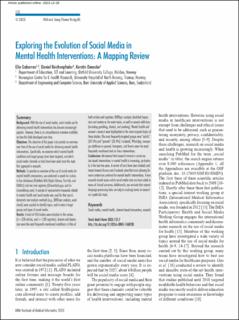| dc.description.abstract | Background: With the rise of social media, social media use for delivering mental health interventions has become increasingly popular. However, there is no comprehensive overview available on how this field developed over time.
Objectives: The objective of this paper is to provide an overview over time of the use of social media for delivering mental health interventions. Specifically, we examine which mental health conditions and target groups have been targeted, and which social media channels or tools have been used since this topic first appeared in research.
Methods: To provide an overview of the use of social media for mental health interventions, we conducted a search for studies in four databases (PubMed; ACM Digital Library; PsycInfo; and CINAHL) and two trial registries (Clinicaltrials.gov; and Cochranelibrary.com). A sample of representative keywords related to mental health and social media was used for that search. Automatic text analysis methods (e.g., BERTopic analysis, word clouds) were applied to identify topics, and to extract target groups and types of social media.
Results: A total of 458 studies were included in this review (n=228 articles, and n=230 registries). Anxiety and depression were the most frequently mentioned conditions in titles of both articles and registries. BERTopic analysis identified depression and anxiety as the main topics, as well as several addictions (including gambling, alcohol, and smoking). Mental health and women's research were highlighted as the main targeted topics of these studies. The most frequently targeted groups were “adults” (39.5%) and “parents” (33.4%). Facebook, WhatsApp, messenger platforms in general, Instagram, and forums were the most frequently mentioned tools in these interventions.
Conclusions: We learned that research interest in social media-based interventions in mental health is increasing, particularly in the last two years. A variety of tools have been studied, and trends towards forums and Facebook show that tools allowing for more content are preferred for mental health interventions. Future research should assess which social media tools are best suited in terms of clinical outcomes. Additionally, we conclude that natural language processing tools can help in studying trends in research on a particular topic. | en_US |

